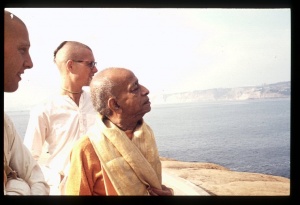SB 1.13.5: Difference between revisions
m (1 revision(s)) |
(Vanibot #0054 edit - transform synonyms into clickable links, which search similar occurrences) |
||
| (One intermediate revision by one other user not shown) | |||
| Line 1: | Line 1: | ||
{{info | {{info | ||
|speaker= | |speaker=Sūta Gosvāmī | ||
|listener=Sages of | |listener=Sages of Naimiṣāraṇya | ||
}} | }} | ||
[[Category:Srimad-Bhagavatam - Canto 01 Chapter 13|S05]] | |||
[[Category:Bhagavatam Verses Spoken by Suta Gosvami - Vanisource|011305]] | |||
<div style="float:left">'''[[Srimad-Bhagavatam]] - [[SB 1|First Canto]] - [[SB 1.13: Dhrtarastra Quits Home|Chapter 13: Dhṛtarāṣṭra Quits Home]]'''</div> | |||
<div style="float:right">[[File:Go-previous.png|link=SB 1.13.3-4]] '''[[SB 1.13.3-4]] - [[SB 1.13.6]]''' [[File:Go-next.png|link=SB 1.13.6]]</div> | |||
{{CompareVersions|SB|1.13.5|SB 1965|SB 1972-77}} | |||
{{RandomImage}} | |||
==== TEXT 5 ==== | ==== TEXT 5 ==== | ||
<div class="verse"> | |||
<div | :pratyujjagmuḥ praharṣeṇa | ||
pratyujjagmuḥ praharṣeṇa | :prāṇaṁ tanva ivāgatam | ||
prāṇaṁ tanva ivāgatam | :abhisaṅgamya vidhivat | ||
abhisaṅgamya vidhivat | :pariṣvaṅgābhivādanaiḥ | ||
pariṣvaṅgābhivādanaiḥ | |||
</div> | </div> | ||
| Line 18: | Line 23: | ||
==== SYNONYMS ==== | ==== SYNONYMS ==== | ||
<div class="synonyms"> | |||
<div | ''[//vanipedia.org/wiki/Special:VaniSearch?s=prati&tab=syno_o&ds=1 prati]'' — towards; ''[//vanipedia.org/wiki/Special:VaniSearch?s=ujjagmuḥ&tab=syno_o&ds=1 ujjagmuḥ]'' — went; ''[//vanipedia.org/wiki/Special:VaniSearch?s=praharṣeṇa&tab=syno_o&ds=1 praharṣeṇa]'' — with great delight; ''[//vanipedia.org/wiki/Special:VaniSearch?s=prāṇam&tab=syno_o&ds=1 prāṇam]'' — life; ''[//vanipedia.org/wiki/Special:VaniSearch?s=tanvaḥ&tab=syno_o&ds=1 tanvaḥ]'' — of the body; ''[//vanipedia.org/wiki/Special:VaniSearch?s=iva&tab=syno_o&ds=1 iva]'' — like; ''[//vanipedia.org/wiki/Special:VaniSearch?s=āgatam&tab=syno_o&ds=1 āgatam]'' — returned; ''[//vanipedia.org/wiki/Special:VaniSearch?s=abhisaṅgamya&tab=syno_o&ds=1 abhisaṅgamya]'' — approaching; ''[//vanipedia.org/wiki/Special:VaniSearch?s=vidhi&tab=syno_o&ds=1 vidhi]-[//vanipedia.org/wiki/Special:VaniSearch?s=vat&tab=syno_o&ds=1 vat]'' — in due form; ''[//vanipedia.org/wiki/Special:VaniSearch?s=pariṣvaṅga&tab=syno_o&ds=1 pariṣvaṅga]'' — embracing; ''[//vanipedia.org/wiki/Special:VaniSearch?s=abhivādanaiḥ&tab=syno_o&ds=1 abhivādanaiḥ]'' — by obeisances. | ||
</div> | </div> | ||
| Line 26: | Line 30: | ||
==== TRANSLATION ==== | ==== TRANSLATION ==== | ||
<div class="translation"> | |||
<div | |||
With great delight they all approached him, as if life had returned to their bodies. They exchanged obeisances and welcomed each other with embraces. | With great delight they all approached him, as if life had returned to their bodies. They exchanged obeisances and welcomed each other with embraces. | ||
</div> | </div> | ||
| Line 34: | Line 37: | ||
==== PURPORT ==== | ==== PURPORT ==== | ||
<div class="purport"> | |||
<div | |||
In the absence of consciousness, the limbs of the body remain inactive. But when consciousness returns, the limbs and senses become active, and existence itself becomes delightful. Vidura was so dear to the members of the Kaurava family that his long absence from the palace was comparable to inactivity. All of them were feeling acute separation from Vidura, and therefore his return to the palace was joyful for all. | In the absence of consciousness, the limbs of the body remain inactive. But when consciousness returns, the limbs and senses become active, and existence itself becomes delightful. Vidura was so dear to the members of the Kaurava family that his long absence from the palace was comparable to inactivity. All of them were feeling acute separation from Vidura, and therefore his return to the palace was joyful for all. | ||
</div> | </div> | ||
__NOTOC__ | |||
<div style="float:right; clear:both;">[[File:Go-previous.png|link=SB 1.13.3-4]] '''[[SB 1.13.3-4]] - [[SB 1.13.6]]''' [[File:Go-next.png|link=SB 1.13.6]]</div> | |||
__NOTOC__ | |||
__NOEDITSECTION__ | |||
Latest revision as of 17:58, 17 February 2024

A.C. Bhaktivedanta Swami Prabhupada
TEXT 5
- pratyujjagmuḥ praharṣeṇa
- prāṇaṁ tanva ivāgatam
- abhisaṅgamya vidhivat
- pariṣvaṅgābhivādanaiḥ
SYNONYMS
prati — towards; ujjagmuḥ — went; praharṣeṇa — with great delight; prāṇam — life; tanvaḥ — of the body; iva — like; āgatam — returned; abhisaṅgamya — approaching; vidhi-vat — in due form; pariṣvaṅga — embracing; abhivādanaiḥ — by obeisances.
TRANSLATION
With great delight they all approached him, as if life had returned to their bodies. They exchanged obeisances and welcomed each other with embraces.
PURPORT
In the absence of consciousness, the limbs of the body remain inactive. But when consciousness returns, the limbs and senses become active, and existence itself becomes delightful. Vidura was so dear to the members of the Kaurava family that his long absence from the palace was comparable to inactivity. All of them were feeling acute separation from Vidura, and therefore his return to the palace was joyful for all.